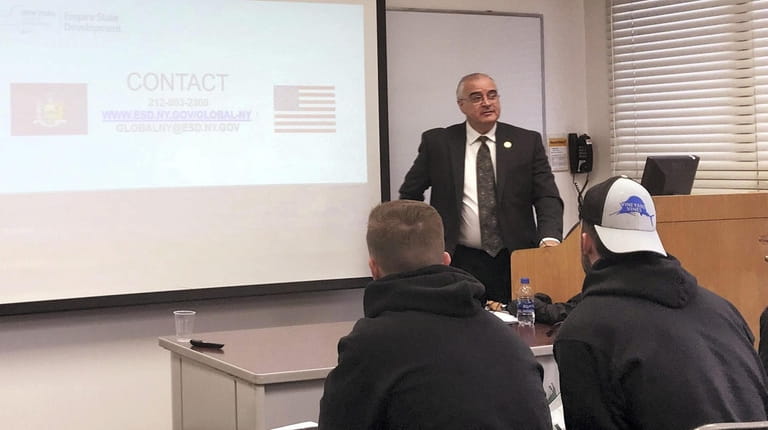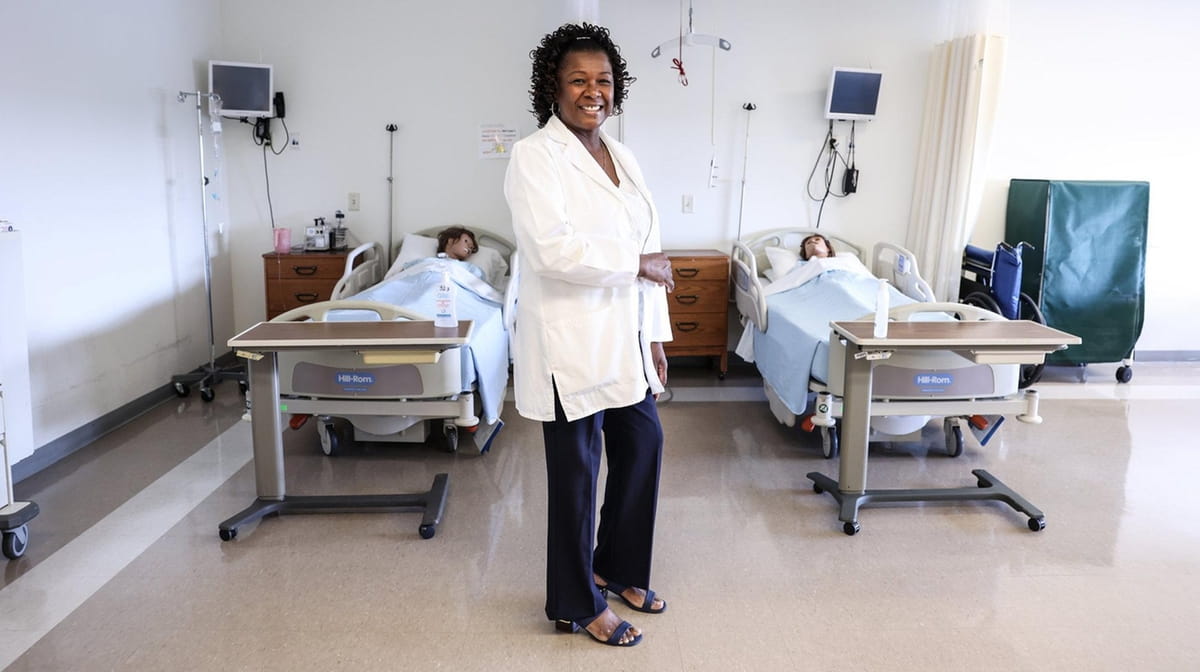Ronald Tabbitas is an executive at Telephonics, but to students at St. Joseph’s College, he’s a teacher. Rose Ann Polite heads to work in the emergency room most days, but to a nursing classroom once a week. In addition to working for the state Department of Environmental Conservation, Jim Gilmore teaches fisheries management at Stony Brook University. And after more than 30 years as a manager for the U.S. Postal Service, Joseph Celentano is senior adjunct faculty at Adelphi University.
These Long Islanders are just a few of the many who have parlayed professional careers into a second gig as adjunct instructors.
"I realized that a manager is a teacher, whether you are mentoring others or looking to serve any of your stakeholders," Celentano said about choosing to teach. "I believe I have an obligation to pay it forward by helping students prepare for a successful career."
Colleges and universities have increasingly relied on a virtual army of adjunct instructors, many of them older, teaching courses on Zoom, online and in-person. St. Joseph's College in Patchogue has about 300 adjuncts, including 53% who are at least 50. Stony Brook University has 200 to 250 adjuncts at any time, including 25% who retired from primary jobs, according to school officials. Nassau Community College had about 620 adjunct faculty in fall of 2020.
"We have retired accounting firm partners, human resources executives, health care executives, teachers and school administrators," said Eileen White Jahn, St. Joseph’s executive dean. "The common thread is that they want to give back to their fields by helping students in higher education who are starting out or changing careers."
Nationwide, 42.9% of faculty were part-time in 2019, according to a recent study by the American Association of University Professors. At schools granting associate’s degrees, 60.6% were part time.
I said, 'Teaching is something I really want to do.' I really do love it.” — Rose Ann Polite
Rx for education
Rose Ann Polite’s primary job is as an emergency department nurse at NewYork-Presbyterian, the health system where she has worked for more than 25 years. That would be more than enough for most people. But once a week, she dons a lab coat to teach future nurses.
Polite, a Nassau County resident in her 50s, has primarily been teaching first-year nursing courses at Nassau Community College since 2010.
"People go into nursing for different reasons," she said. "I knew I wanted to be a nurse for a long time."
Her younger sister, who has since died, was diagnosed with an autoimmune liver disease and required care as a child. "That really sprung my interest in the health care field," she said.
Polite, who was born in Barbados and moved to New York City as a girl, graduated from Clara Barton High School for Health Professions in Brooklyn and then studied nursing at Molloy College. She has worked in many jobs at NewYork-Presbyterian, from managing a telemetry unit to a medical surgical unit and home care, in which nurses visit patients at home.
More recently, she recalls enduring the stress of working during the pandemic’s peak, with patients dying daily and PPE "becoming like a part of the uniform." Still, she said, vaccinations have improved hospital work and patient outcomes, and she hasn’t seen a decline in nursing enrollment.
Polite enjoys teaching new nurses, making a difference in their lives and seeing their enthusiasm. "I did some teaching as a nurse when I was doing management. I really liked it," she said. "I said ‘Teaching is something I really want to do.’ I really do love it."

Ron Tabbitas, who teaches business management at St. Joseph's College, leads a training session at Telephonics on Sept. 30, 2021. Credit: Elisamuel DeJesús
In good company
Ronald Tabbitas, director of government compliance at Telephonics, gives his students more than the benefit of his experience. He brings in executives and discusses real-life scenarios.
For a graduate class in operations and quality management, the Selden resident, 58, brought in the Telephonics CEO and streamed in an executive from India to discuss such topics as how they selected a specific site for a joint venture. "Instead doing a case study put into a textbook 10 years ago, students get current market environment, the latest techniques, strategies and technology," Tabbitas said.
Tabbitas, who teaches undergraduate and graduate courses in St. Joseph’s business school, started there in 2004 at age 41. Two staple courses are Problem Solving For Professionals and Critical Thinking for Professionals.
"There have been plenty of surveys about what keeps a CEO up at night," he said. "One of the biggest soft-skills shortages is the ability for our workforce to be effective problem solvers." Rather than talking abstractly about business challenges, he discusses current realities. "We’re dealing with COVID, with supply-chain disruptions," he said. "We bring that into the classroom."
His motivation? He enjoyed training and mentoring in business and "wanted to take it to the next step." And, he benefits: "I stay fresh," he said.
"Making an impact, changing someone’s life," he said are big rewards. "I give them the tools so they progress in their careers."

Jim Gilmore, director of the state Department of Environmental Conservation's Division of Marine Resources, teaches fisheries management at Stony Brook University. Credit: Jim Gilmore
An environmental education
Eight years ago, Jim Gilmore, now 66, tested the waters as an adjunct instructor at Stony Brook University and, except for pausing during the pandemic, he hasn’t stopped.
As director of the state DEC's Division of Marine Resources, Gilmore is responsible for conserving and protecting local fish populations. Teaching Marine Fisheries Management at Stony Brook University was a natural fit.
"I’ve done guest lectures at different universities and I enjoy teaching," he said. "It keeps you grounded from the day-to-day stuff of running a division in a state agency."
The Amityville resident, who started as an adjunct at 57, mixes texts with experience. "The first half of the semester I teach theory/textbook science," he said. "The second half I teach ‘real world,’ adding politics and socioeconomics so students get a realistic experience for management."
Gilmore likes students’ energy and excitement as he opens up not just books, but the world around them, often taking them to a New York State Marine Resource Advisory Council Meeting "to see management in practice."
And Gilmore, who lives near the water, loves the subject matter. "I go fishing as much as I can," he said. "I race a sailboat on the South Shore. I do most of my leisure time on the water. I grew up on it. It feels like my backyard."
“I tapped into my friends who were teachers and colleagues, and did research to figure out the best way to present material.” — Diana Bier
Making things add up
With an MBA from New York University, Diana Bier became a CPA and worked at Ernst & Young for two years before leaving it behind in the 1990s to start her own interior design business. By 2010, Bier had returned to accounting, this time as a part-time teacher of accounting at Molloy College.
"I look at it as a big puzzle, and I love puzzles," she said of being a CPA.
Bier, a Rockville Centre resident now in her 50s, also worked as controller for Irving Trust Co.’s commercial banking division before founding Diana Bier Interiors.
Bier sees her teaching as a good investment in future professionals. "It’s amazing to see the growth of a student," she said, "to spark that love of knowledge."
Learning to teach, she said, "I tapped into my friends who were teachers and colleagues, and did research to figure out the best way to present material."
Bier said she enjoys seeing her students’ success, like recently attending a professional accounting presentation by a former student who graduated in 2015 and now works at Ernst & Young. Other students have gone on to work at the Federal Reserve or accounting firms.
"I’ve had students who are children of immigrants from anywhere in the world," she said of students who have achieved advanced degrees — and success. "It’s so exciting to see them become a professional."

Joseph Celentano, a senior adjunct at Adelphi University's Willumstad School of Business, retired after more than 30 years as a manager at the U.S. Postal Service. Credit: Joseph Celentano
Doing double duty
Joseph Celentano, 66, a senior adjunct at Adelphi University’s Willumstad School of Business, got his first taste of teaching while training employees. "As a manager, I was like a teacher," he explained.
The Huntington resident worked as a manager and a senior manager for more than 30 years. Celentano got an MBA from Adelphi University in 2004, graduating with a 4.0 GPA, and began teaching at Adelphi in 2009, both while still working at the Postal Service, from which he retired in 2014.
"I have a broad business background," he said of the experience he brings to the classroom. "As a senior manager, I met with different departments, financing, marketing, HR. You’re strategizing with different functional departments."
His lessons include the good and the bad. "I want them to learn from what I did well and the mistakes I made," he said. "The key to being a successful manager is communication and showing that you care about those you manage. I got better at both of these as I matured as a manager."
Celentano said he likes to promote "positive leadership" in classes on management, business, international business and organizational behavior.
"We have a problem, we use positivity to solve it," he said. "When I’m positive with you, there’s a spiraling effect. You’re more likely to be positive with the next person you meet."
Title photo: Rose Ann Polite is a nurse for NewYork-Presbyterian health system and nursing instructor at Nassau Community College. | Newsday / Alejandra Villa Loarca

